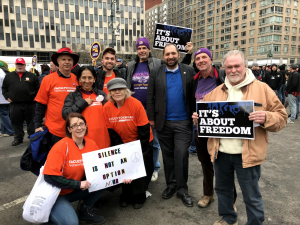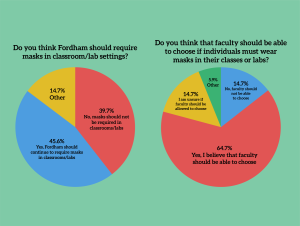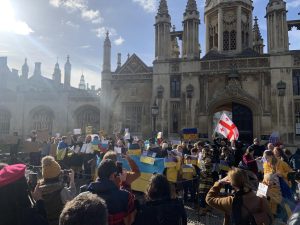Update: Fordham’s Graduate Student Workers Unionize
The Graduate Student Workers Union resumed its outreach with the goal of being recognized by Fordham
COURTESY OF FORDHAM GRADUATE STUDENT WORKERS UNION
Pictured are members of the Fordham Graduate Student Workers Union. The Fordham administration will be hosting a union election on April 5 and 7.
March 30, 2022
UPDATE (April 7, 2022): On Thursday, April 7, student workers in the Graduate School of Arts and Sciences, who make up the Fordham Graduate Student Workers Union, voted 229 to 15 to be represented by the Communication Workers of America (CWA).
Dennis C. Jacobs, provost and senior vice president for academic affairs, announced the decision to unionize and noted that the university plans on sharing information, such as the university’s policies and the graduate student members’ initial requests, with the CWA prior to the negotiations leading up to the drafting of an initial contract. Jacobs added that the university plans on working with the union and its members, the graduate student workers, in the coming months.
After more than a four-year hiatus, the effort toward a Fordham Graduate Student Workers Union (FGSWU) reemerged at the beginning of February with the launch of a union card campaign. The campaign relied on workers signing cards to advocate for union representation from the Communications Workers of America, one of the largest media and communications unions in the United States. Its major employers include AT&T, The New York Times and the state of New Jersey.
The FGSWU movement to unionize began in September 2016, following a landmark decision by the National Labor Relations Board (NLRB) which ruled that the Student Workers of Columbia (SWC) are considered employees and are allowed to unionize. This decision was initially agreed upon in 2000 but was then overturned in 2004.
FGSWU previously supported the Fordham Faculty United unionization, which is a union composed of Fordham’s adjunct professors. In November 2017, 94% of adjunct professors voted in favor of unionization and opted for representation by the Service Employees International Union. In a letter sent on May 19, 2017, University President the Rev. Joseph M. McShane, S.J., announced that Fordham would not object to the unionization of adjunct faculty.
“The pandemic increased the urgency of long-standing issues among graduate student workers.” Benjamin Van Dyne, theology grad student
The current FGSWU is hoping for the same response instead of that which Columbia University gave to the SWC. Columbia appealed the NLRB decision and refused to recognize the union. Despite the NLRB upholding their ruling, Columbia still refused to bargain with the members of the SWC, which prompted intermittent strikes from the union.
At the end of the spring semester in 2017, the FGSWU suspended its social media accounts. After four years, the FGSWU revamped its Twitter campaign, created a new website and launched an Instagram account. Benjamin Van Dyne, head of FGSWU media outreach and current theology graduate student at Fordham, credits the relaunch to the COVID-19 pandemic.
“The pandemic increased the urgency of long-standing issues among graduate student workers,” he said. “During the pandemic many of us were asked to do increased work, in my own case twice as many hours, without a penny of additional compensation.”
According to Van Dyne, graduate student workers have attempted to address these issues through individual conversations with administrators.
“The fact that those conversations have not resulted in meaningful solutions is one reason why an overwhelming majority of eligible workers signed union cards indicating their desire for a union,” he said.
On Feb. 28, 2022, three weeks after the start of the union card campaign, the FGSWU hand-delivered a letter to McShane seeking voluntary recognition from the university in order to begin contract negotiations.
In their letter, the students enclosed a vision statement with a list of objectives they hope to achieve through unionizing that would give them more power over their working conditions.
Some demands in their list include increasing their income, which is currently between $15,000 to $20,000 a year and is below the NYC yearly minimum wage.
Some demands in their list include increasing their income, which is currently between $15,000 to $20,000 a year and is below the NYC yearly minimum wage for 2022 of $27,456. They also seek affordable health insurance, accommodations for working parents and international students, increased funding for graduate employees, and formal grievance structures that provide protection and recourse against harassment, overwork and other workplace issues.
On March 8, the Office of the Provost released a formal statement to the Graduate School of Arts and Sciences community. The statement recognized the value of graduate student workers and their contribution to the university.
“The educational relationship between students and the University is, especially at the graduate level, foundational to our intellectual community and to our commitment to promoting learning and wisdom through research and scholarship,” said Dennis C. Jacobs, provost and senior vice president for Academic Affairs, in the statement. The university also recognized that student workers have the right to unionize under an election process.
Fordham also created a Frequently Asked Questions page dedicated to FGSWU’s process of unionization on the university’s main website under Academic and Faculty Resources. This page states that Fordham recognizes its graduate student assistants as students, first and foremost.
“From time to time, graduate students also are assigned duties, such as teaching or research, as part of their training toward a graduate degree,” the page noted.
Bob Howe, assistant vice president for communications, said that Fordham respects the rights of its graduate student workers to decide whether to form a union. According to Howe, the university wants to ensure a free and fair election and is working with the union to schedule one.
“What anyone can see is that despite their protests that they want to stay neutral, Fordham’s administration has hired one of the most notorious anti-union law firms in the country.” Benjamin Van Dyne
The university has also engaged a law firm, Jackson Lewis, for advice as they navigate the process. Jackson Lewis represents many companies, such as Burger King and Target. In 2019, Jackson Lewis held a training program to help employers remain “Union Free.” The FGSWU believes that this directly goes against Fordham’s neutral stance.
“What anyone can see is that despite their protests that they want to stay neutral, Fordham’s administration has hired one of the most notorious anti-union law firms in the country, Jackson Lewis,” Van Dyne said. “Firms like that typically cost a university hundreds or even thousands of dollars per hour and help disseminate misleading information about the union.”
The next step for the FGSWU is voting in the election overseen by the National Labor Relations Board in accordance with its processes. The graduate students’ efforts continue as they urge Fordham’s administration to sign a neutrality agreement in that election so that graduate student workers can add input into their workplace conditions.















